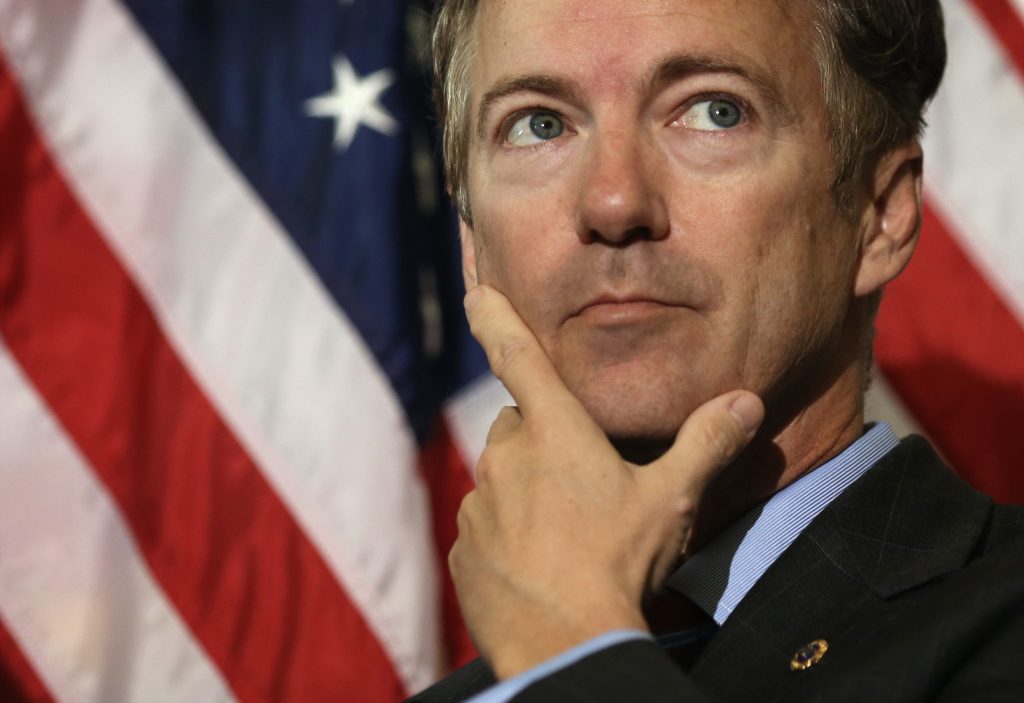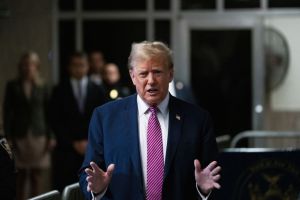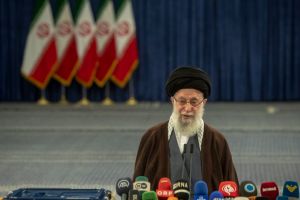‘What does the kooky libertarian see in the authoritarian Putin regime?’
So asked the Weekly Standard’s Editor-in-Chief Stephen F. Hayes on Tuesday in his op-ed ‘Rand Paul, Russian Stooge’.
‘Senator Rand Paul has been making the rounds in recent days touting deeper US engagement with Vladimir Putin’s Russia. It’s often the case when Senator Paul talks about foreign policy his pronouncements are a curious admixture of odd conspiracy theories, pacifist banalities, and ahistorical analogies—all delivered with the confident condescension of someone who doesn’t have any idea what he’s talking about.’
Hayes’s piece is laden with similar insults, where Paul’s supposedly ‘lonely effort to provide intellectual backing for Donald Trump’s instinctive desire to make nice’ is dismissed as mere ‘foolishness,’ as is the senator’s general more restrained foreign policy worldview.
Which is really the subtext to why Hayes is upset — Paul had the nerve to go to Russia emphasising diplomacy in tandem with a Republican president explicitly seeking peace. Trump and Paul believe in talking to foreign adversaries, against the will of virtually the entire Washington foreign policy establishment, most particularly hawks like Hayes.
In other words, it’s not exactly the Weekly Standard’s Republican party anymore.
For many years, neoconservatives had outsized influence in shaping Republican foreign policy, which typically meant striking an aggressive posture in lieu of diplomacy, or as Sen. Paul has often framed it ‘shoot first, ask questions later.’ The 2003 US invasion of Iraq was the neocons’ philosophy put into disastrous action, where failure to ask the right questions beforehand — by both politicians and the media — led to a war most Americans and people around the world today consider a mistake by any measure.
But not the neoconservatives. They still defend it.
For them, the only foreign policy mistakes are inaction.
Hayes lampoons Paul for believing that most opposed to Trump’s Russian diplomacy want war, citing Paul’s 2014 comment on the Ukraine crisis, ‘Some on our side are so stuck in the Cold War era that they want to tweak Russia all the time and I don’t think that is a good idea.’
But Hayes’s own position on Ukraine reinforces Paul’s position on hawks like him. In 2014, Hayes chided President Obama for not sending American military men and women into that conflict, saying on Fox News (emphasis added), ‘[If] we had said when Russia first invaded Crimea, if we had sent troops, hopefully more than 150, to our NATO allies at that time, it would have suggested that the president was resolute, that he was determined not to let Russia push our allies around.’
Though Hayes mocks Paul’s portrayal of neoconservatives as eager for war, the fact remains that Hayes and his fellow ideological travelers continue to unscrupulously want boots on the ground abroad and support regime change in hotspots like Libya, Syria and Iran, as if the Iraq War never happened.
Paul is not imagining this. This is not ‘pacifist banality.’ The common stereotype of neoconservatives as ‘warmongers’ is generally true no matter how you slice it.
The Weekly Standard carried so much weight during the George W. Bush administration, that Vice President Dick Cheney said it was the ‘best source of information’ to find out about the relationship between Saddam Hussein and al-Qaeda.
But there was one major problem: There was never a relationship between Hussein and al-Qaeda.
Still, Cheney said, ‘I think Steve Hayes has done an effective job in his article of laying out a lot of those connections.’ Hayes would write an entire book called The Connection about the supposed ties between Hussein and Osama bin Laden.
This theory was made up, based on the discredited Feith memo (described as ‘alternative intelligence’) Hayes used as his source. President Cheney eventually reluctantly admitted there was no connection after originally promoting this theory in gin up support for war with Iraq.
Many Americans bought into it though, especially when mouthed by no less an authority than the Vice President.
To date, Hayes’s Hussein-bin Laden ‘connection’ is arguably the most damaging conspiracy theory to take root in the history of the US. Perhaps the biggest difference between conspiracy nut Alex Jones and Hayes is that Jones’s baseless musings never helped start a war.
If Hayes is looking for ‘kooks’, he might want to look in the mirror.
Hayes was allowed to concoct such a fantasy precisely because he, Cheney and others of like-mind were more eager to find reasons for war, than reasons not to go to war, as is the neoconservatives’ eternal proclivity. The Weekly Standard was able to aid the Bush administration with such a fabrication, because neocons were in the foreign policy driver’s seat during that era.
Today, they are not, and that’s putting it mildly. The Weekly Standard’s founder, Bill Kristol, is today’s leading ‘Never Trumper.’ Many neoconservatives supported Hillary Clinton during the election, precisely because they thought she would be more hawkish than Trump.
President Trump has blasted Bush and calls the Iraq War ‘the single worst decision ever made.’ According to Politico this month, Trump refers to his own neocon advisers like John Bolton as ‘eggheads’, instead opting for foreign policy counsel with the more non-interventionist Sen. Paul regarding US relations with not only Russia but Iran.
The relationship between Trump and Paul could potentially have significant ramifications for the future of the Republican Party. ‘There is a wing of the party, represented by Paul and his modest but loyal network, ready to pick up the mantle of a more restrained Republican foreign policy if no Trump-style America First nationalists are ready to do so in the 2020s,’ wrote Spectator USA’s Daniel McCarthy last week. ‘And if Trump-like Republican nationalists are able to institutionalise, or remain a force in politics one way or the other, they will have Paul Republicans by their side to reinforce their aversion to foreign interventionism.’
Hayes and his neoconservative friends once used their White House connections to pursue their agenda, and now their greatest foreign policy rival within the Republican party is doing the same under a very different GOP administration.
How successful Paul is in helping course-correct American foreign policy under Donald Trump is anyone’s guess. But figuring out why The Weekly Standard and its editor so harshly targets Rand Paul in this moment is no mystery.
Jack Hunter is the former political editor of Rare.us and co-authored the 2011 book The Tea Party Goes to Washington with Senator Rand Paul.


















